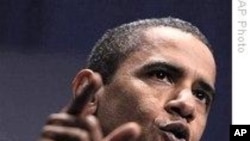One year after his election as U.S. president, Barack Obama faces an increasingly challenging political situation at home, with rising anger on the right and growing nervousness among many of his fellow Democrats in Congress.
It has been a difficult week for the nation's 44th president.
The latest unemployment figures put the jobless rate at 10.2 percent, the highest level since 1983.
President Obama said the latest figures were regretful, but he promised to continue his efforts to turn the U.S. economy around.
"I'm confident that our economy will recover, I'm confident that we are moving in the right direction, and I promise that I won't rest until America prospers once again," he said.
While other economic indicators are more optimistic, chronic unemployment could really hurt the president and his Democratic allies in Congress in next year's congressional midterm elections.
MSNBC political analyst Richard Wolffe was a guest on VOA's Issues in the News program.
"Unemployment is an enormous problem and the chances of it staying high and going higher are pretty strong, so huge political problems there for the administration and for all politicians," he said.
In addition, some Democrats are worried following Republican election victories in governor's races in New Jersey and Virginia. Last November, candidate Barack Obama won the presidency with help from independent voters. But in Tuesday's elections in New Jersey and Virginia, independents largely abandoned the Democratic candidates and voted Republican, a potentially ominous sign for Democrats as they head into next year's congressional election campaign.
"I do think this is an enormous wake-up call for President Obama," said Tom DeFrank, a longtime observer of U.S. politics and Washington bureau chief for the New York Daily News. "You cannot, as the White House is furiously tried to spin, say it had nothing to do with us. It bespoke voter disenchantment and voter unhappiness."
The Republican resurgence is complicating the president's efforts to enact his top domestic priority, reforming the U.S. health care system.
Republicans are also trying to take advantage of a kind of populist uprising on the right that first surfaced during the health care debate earlier this year at angry town hall meetings around the country.
Thousands of those activists came back to Washington this week with a renewed determination to kill the health care plan being put together by the Obama White House and Democrats in Congress.
Longtime Hollywood actor Jon Voight was among those who spoke at a rally in front of the U.S. Capitol.
"We do not want our freedom of choice taken away from us," he said. "President Obama has his own obsession with trying to ram this health care bill through to create a socialist America."
The tone from the president's critics has grown increasingly harsh and aggressive in recent months. It also sets the stage for a nasty midterm election campaign next year, says MSNBC analyst Richard Wolffe.
"Voters are in an ugly, mean mood," said Wolffe. "They want to kick out incumbents whether they are actually incumbents or just the established party, and that is true for Democrats and it is also true for Republicans."
Historically, the party that controls the White House loses congressional seats during a new president's first midterm election.
Political analyst Stuart Rothenberg says Democrats are going to have to work hard to limit their losses next year.
"Democrats are going to have a very challenging job to do next year in getting out their core Democratic constituencies," said Rothenberg, a guest on VOA's Encounter program. "When we looked at the exit polls in both Virginia and New Jersey, we saw a dramatic, dramatic drop-off in younger voters."
The Republican wins in New Jersey and Virginia are also likely to have a chilling effect on efforts by the president and congressional Democrats to enact ambitious reform measures on health care and climate change.
Analyst John Fortier of the American Enterprise Institute says moderate and conservative Democrats may be reluctant to risk their own political futures in next year's election by supporting ambitious reform plans this year.
"They would like to get something done, but their key votes to get things done are those moderates, and a likely solution for them if they follow this course is to pass a relatively significant plan, but one that looks a lot more like what the moderates in the Senate and the more moderate plans that came out of the Senate Finance Committee looked like at the beginning, not the plans more to the left that the House and other bodies are pushing," he said.
Republicans will have their own political challenges looking ahead to next year as they seek to unify their party.
While grass roots conservative anger is driving the opposition to the Democrats' health care bill, the Republican candidates who won in New Jersey and Virginia this past week positioned themselves as political moderates who were able to appeal to independent voters as well as traditional Republican activists.




